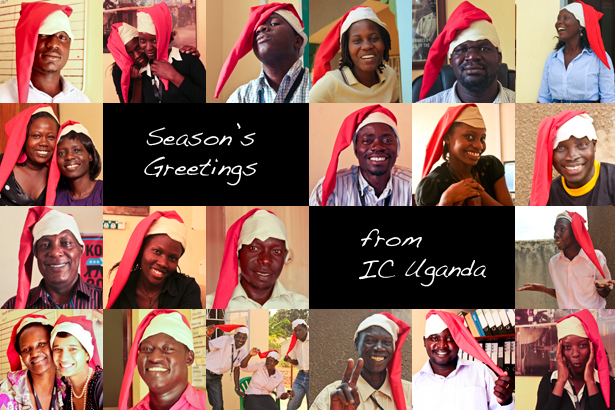
What is Christmas like in Uganda? I had a chance to chat with some of the Invisible Children Uganda staff about their Christmas traditions and what the holiday season means to them.
What is the holiday season like in Uganda?
Germina: Stores cut prices and there are sales on things like TVs, but food and bus fares are more expensive during holidays.
Tony: In my childhood my mom would buy shoes and clothes 3 weeks before. We normally would eat meat and rice. At that time we only ate meat on holidays. Now it’s different; Gulu is developing and people can eat meat and buy clothes anytime they want. Christmas is the day young people like me can organize a party and celebrate from Christmas to New Year’s.
Jude: It’s a time for meeting friends you haven’t seen for long. It’s a time people show off their acquisitions, clothes, cars or maybe a house. From around 24th to the 3rd, people are eating meat. They think Christmas is all about meat. Mostly people start partying too early, by Christmas day they are zonked. There is a traffic jam leaving the city as people go to the village.
Jennifer: It’s a time of family reunion when everyone comes from where they are and goes to the village. It’s also a time of thanksgiving when the family goes to church and gives thanks for the year. It’s a big feast, from Christmas to New Year’s there’s a lot of drinking and eating.
Do you have Santa Claus?
Germina: The aspect of Santa just came recently, and we call him Father Christmas. Mostly kids’ Christmas parties are where you find Santa Claus. It’s just a new initiative in Uganda.
Christopher: No, we have no idea about it.
Tony: No.
Jude: No, but we have groups of people who come and sing. They come in the night. I was in the village and it was 3AM when they came. We had to get up, put the light on. They sang two Christmas carols and we gave them some [small gifts].
Do you decorate for Christmas?
Germina: The seasonal colors are red and green. We hang Christmas decorations around the whole city in many colors: gold, purple, maroon. I always decorate our tree at home. We get a bucket, fill it with stones and plant a real Christmas tree. I decorate using small drums, colorful angels, and a huge old necklace that is older than me, and a fat Father Christmas. A star on top. On New Year’s, instead of fireworks, we burn the Christmas tree.
Christopher: When we are in the village, we would put bricks along the road to create a path up to our home. You mix water and ash and paint the bricks white. Then you make sure the compound is clean – send your children very early to sweep.
Tony: When I was younger we would decorate trees with toilet paper and balloons, because we thought it was cool.
What are your holiday traditions?
Germina: We just come together, it’s like a meeting point in our lives because we are all scattered around the country. I always make sure I have certain special foods that we only make at Christmas. We Skype with my half-sister in Belgium.
Jennifer: For children, when it’s Christmas everyone needs to have a new dress, new clothes, new shoes. There are big markets from this time in the village where people will do their Christmas shopping. By New Year all the soda may be sold out. If you go to church on Christmas, you won’t find a seat. The church will definitely be full.
Christopher: You put on nice clothes. Prayer is very important that day. Some people go at night to attend prayer while others prepare food and drinks at home. Normally, seasonal preparations begin early, with groups doing gardening to earn money for buying food and drinks that you need for that day. Everyone from the community will gather in one place and celebrate from there, for 2 days.
Do you give gifts?
Jennifer: We don’t gift. It’s all about staying together.
Germina: My family gives each other gifts, and we give cards and chickens and eggs to the neighbors and relatives. We all contribute to the celebration. My contribution this year is a crate of soda and malakwang (I have to get the recipe for malakwang, because I promised my father I would make it).
Christopher: You make sure that each one in the community goes home very happy. Maybe an old man or woman who cannot afford to buy things, you might give them a goat or some meat. I remember when I was young, there was an old man who lived near us but was separated from our village by a river. My father killed a goat and took [7 pounds] of meat from it for me to deliver to the old man. To him, he thought there would be nothing that day, but when I gave him the meat I think he then enjoyed the day.
Think people should hear about this?